|
Relevant
books
available at Amazon
Many Augustine
translations
and studies with links to Amazon
A selection below
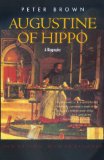 
Peter Brown biography
--------
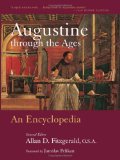 
Allan Fitzgerald --------
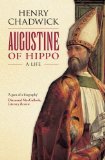 
Henry Chadwick
a short indroduction --------
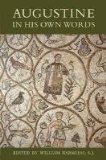 
William Harmless.
Extracts from several of Augustine's main works --------
 
Henry Chadwick's translation of "Confessions" --------
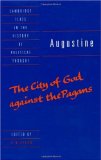 
R.W.Dyson's translation of "The City of God" --------
 
R.P.H. Green's translation of "On Christian Teaching" --------
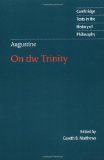 
Gareth Matthews' translation of "On The Trinity" (books 8 - 15) |
Book 15, Chapter 17
30. Just as sometimes all the utterances of the Old Testament together in the
Holy Scriptures are signified by the name of the Law. For the apostle, in citing
a text from the prophet Isaiah, where he says, “With divers tongues and with
divers lips will I speak to this people,” yet prefaced it by, “It is written in
the Law.” And the Lord Himself says, “It is written in their Law, They hated me
without a cause,” whereas this is read in the Psalm. And sometimes that which
was given by Moses is specially called the Law: as it is said, “The Law and the
Prophets were until John;” and, “On these two commandments hang all the Law and
the Prophets.” Here, certainly, that is specially called the Law which was from
Mount Sinai. And the Psalms, too, are signified under the name of the Prophets;
and yet in another place the Saviour Himself says, “All things must needs be
fulfilled, which are written in the Law, and the Prophets, and the Psalms
concerning me.” Here, on the other side, He meant the name of Prophets to be
taken as not including the Psalms. Therefore the Law with the Prophets and the
Psalms taken together is called the Law universally, and the Law is also
specially so called which was given by Moses. Likewise the Prophets are so
called in common together with the Psalms, and they are also specially so called
exclusive of the Psalms. And many other instances might be adduced to teach us,
that many names of things are both put universally, and also specially applied
to particular things, were it not that a long discourse is to be avoided in a
plain case. I have said so much, lest any one should think that it was therefore
unsuitable for us to call the Holy Spirit Love, because both God the Father and
God the Son can be called Love.
31. As, then, we call the only Word of God specially by the name of Wisdom,
although universally both the Holy Spirit and the Father Himself is wisdom; so
the Holy Spirit is specially called by the name of Love, although universally
both the Father and the Son are love. But the Word of God, i.e. the
only-begotten Son of God, is expressly called the Wisdom of God by the mouth of
the apostle, where he says, “Christ the power of God, and the wisdom of God.”
But where the Holy Spirit is called Love, is to be found by careful scrutiny of
the language of John the apostle, who, after saying, “Beloved, let us love one
another, for love is of God,” has gone on to say, “And every one that loveth is
born of God, and knoweth God. He that loveth not, knoweth not God; for God is
love.” Here, manifestly, he has called that love God, which he said was of God;
therefore God of God is love. But because both the Son is born of God the
Father, and the Holy Spirit proceeds from God the Father, it is rightly asked
which of them we ought here to think is the rather called the love that is God.
For the Father only is so God as not to be of God; and hence the love that is so
God as to be of God, is either the Son or the Holy Spirit. But when, in what
follows, the apostle had mentioned the love of God, not that by which we love
Him, but that by which He “loved us, and sent His Son to be a propitiator for
our sins,” and thereupon had exhorted us also to love one another, and that so
God would abide in us,—because, namely, he had called God Love; immediately, in
his wish to speak yet more expressly on the subject, “Hereby,” he says, “know we
that we dwell in Him, and He in us, because He hath given us of His Spirit.”
Therefore the Holy Spirit, of whom He hath given us, makes us to abide in God,
and Him in us; and this it is that love does. Therefore He is the God that is
love. Lastly, a little after, when he had repeated the same thing, and had said
“God is love,” he immediately subjoined, “And he who abideth in love, abideth in
God, and God abideth in him;” whence he had said above, “Hereby we know that we
abide in Him, and He in us, because He hath given us of His Spirit.” He
therefore is signified, where we read that God is love. Therefore God the Holy
Spirit, who proceedeth from the Father, when He has been given to man, inflames
him to the love of God and of his neighbor, and is Himself love. For man has not
whence to love God, unless from God; and therefore he says a little after, “Let
us love Him, because He first loved us.” The Apostle Paul, too, says, “The love
of God is shed abroad in our hearts by the Holy Ghost, which is given unto us.”
|

